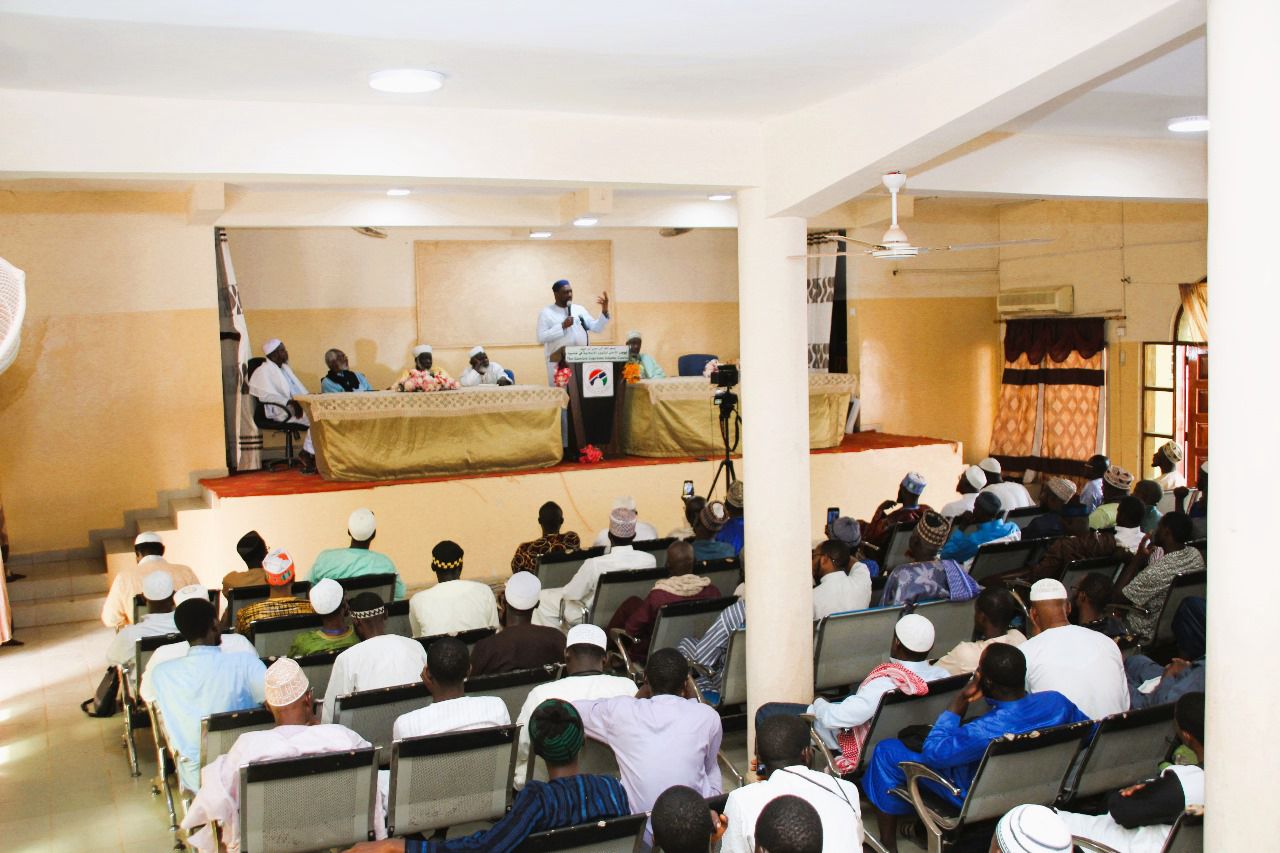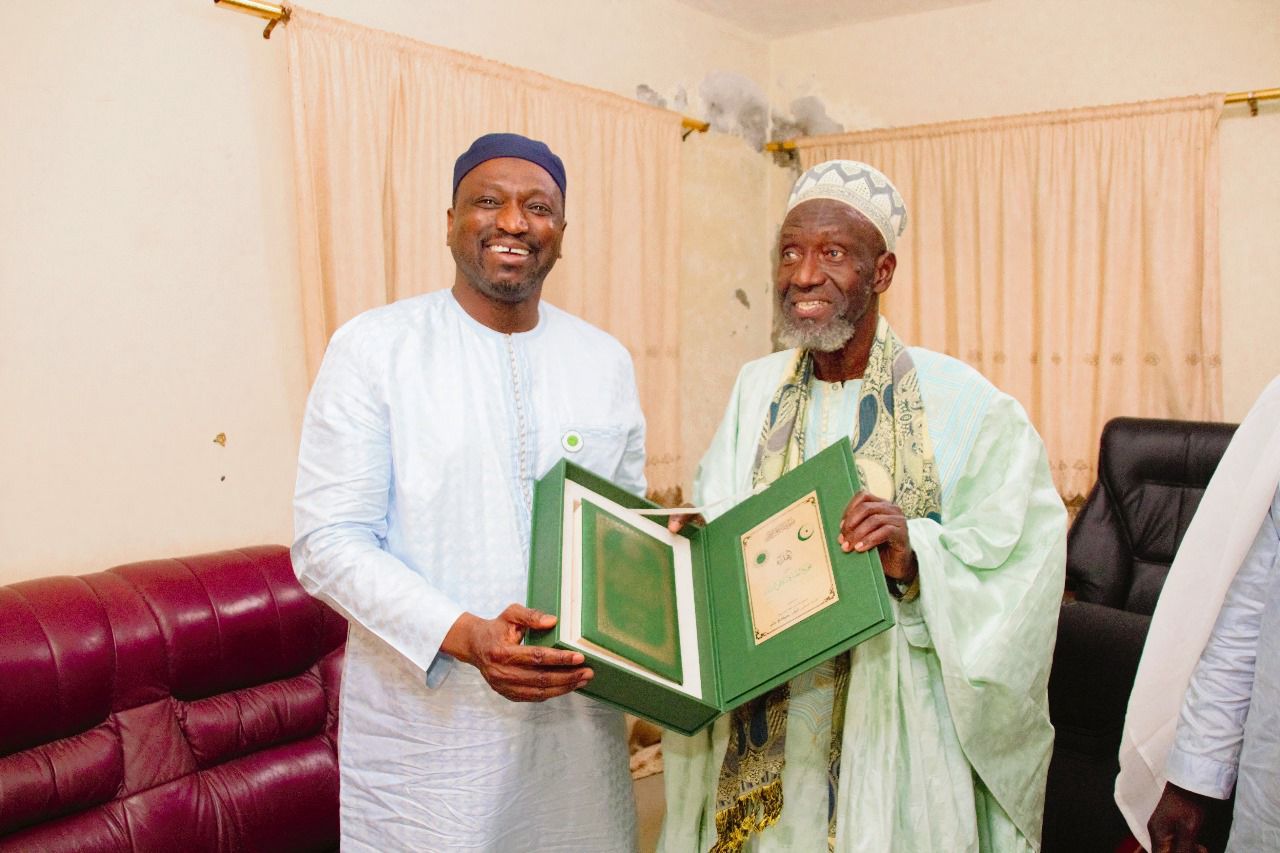
On the sidelines of the OIC’s 15th Islamic Summit held in Gambia on 24-25 Shawal 1445, corresponding to 4-5 May 2024, H.E. Prof. Koutoub Moustapha Sano, Secretary General of the Academy, delivered a lecture entitled: “Issues and Developments in Contemporary Islamic Jurisprudence: Girls’ Education and Interfaith Dialogue”, on Friday 23 Shawal 1445, corresponding to 03 May 2024, at the Doha Conference Hall at the Supreme Islamic Council’s headquarters.
In the presence of several scholars, academics, and students, the President of the Supreme Islamic Council in The Gambia, Sheikh Issa Dabo, welcomed His Excellency, and the accompanying delegation, and on behalf of the audience, he thanked His Excellency for visiting the Islamic Council and giving a lecture at its headquarters, and expressed his great pleasure in honoring the Supreme Islamic Council by agreeing to sign a cooperation agreement . He then invited His Excellency to deliver his lecture, praying that the audience will benefit from his enlightening and distinguished thought.
At the beginning of his lecture, His Excellency welcomed the audience and spoke about the Academy, its vision, objectives, means, and values, which include examining new issues and developments, working to correct misconceptions about Islam, and helping Muslims understand the reality they live in. His Excellency pointed out that flexibility makes Islam a religion in which some of its jurisprudential rulings change as times and circumstances change.
His Excellency also explained that the fatwa before the affliction is different from the one after the affliction, pointing out that issues on which there are no definitive texts or on which there are speculative texts should be reconsidered by the scholar in light of changes in reality, in compliance with the fiqh maxim: There is no denying that a fatwa changes with the change of times, places, customs, traditions, conditions, and situations.
His Excellency spoke about the importance of collective Ijtihad, which dates to the Prophet’s time (PBUH), as his approach to Ijtihad on issues in his time was by gathering the people of knowledge and experience from among the companions (RA) and consult them on those issues. This shows that such issues should be addressed by the people of knowledge and jurisprudence throughout the ages. His Excellency explained that collective ijtihad may reach a consensus if all participants agree on a ruling, and if they cannot agree, it may lead to a majority consensus, and the consensus reached by the people of collective ijtihad, whether it is consensus or majority consensus, should be adhered to. His Excellency pointed out that the decision to go out to meet the Quraysh outside Medina in the Battle of Uhud resulted from the collective ijtihad approved by the majority of Mujtahids. The Prophet (PBUH) accepted most of companions’ opinions to meet the polytheists outside the city, even though he first thought not to go out but to stay inside the city.
His Excellency also spoke about other issues such as the beginning and end of the holy month of Ramadan in Muslim countries being subject to the prerogative of the authorities set up by theauthorities and not the prerogative of individuals, and what is decided by these authorities cannot be disputed, and disputing it is considered an infringement on the ruler’s authority. His Excellency concluded by stating that it is obligatory to refer to Gambia’s Supreme Islamic Council in public matters and to abide by its ruling in order to preserve the order in the contry’s affairs.
His Excellency then spoke about the importance and status of knowledge in Islam in both sciences: He emphasized the importance of enabling girls and women to have the same access to education as boys, pointing out that there are some people – may Allah guide them ! – who forbid girls from getting an education under the guise of avoiding mixing and other flimsy excuses that are contrary to the Quran, the Sunnah and the Ummah consensus across ages, while stressing that the education of males and females is explained by the Hadith “Seeking knowledge is obligatory for every Muslim,” and the word “Muslim” generally refers to both males and females. Today, it is necessary to allow girls to receive both religious and worldly education in the same way as their male counterparts, in compliance with the texts in the Quran and Sunnah that do not differentiate between males and females, and the Ummah has not disagreed on this matter throughout the ages.
Furthermore, His Excellency added: “Islam considers education, both religious and worldly, and all its stages, to be a sacred and inalienable legal right for males and females, and a duty upon the family, society, and the state towards both male and female children. It is not permissible for anyone, whomever he may be, to deprive any female or male of any type of education because the purpose of education is to enable the learner to acquire knowledge, skills, and values that help him worship Allah, thrive in the universe, and achieve happiness in this world and the next, and this purpose can only be achieved by both types of education.”
His Excellency called on those in charge of religious schools in the Republic of Gambia to reconsider their educational curricula to keep pace with the requirements of our era and enable young people to learn the principles of religious and worldly sciences.
At the end of the meeting, Dr. Abdulkadir Sillah expressed his thanks and appreciation to the Secretary General and the accompanying delegation and urged the attendees—especially students—to emulate these scholars. Additionally, His Excellency and Supreme Islamic Council’s President signed a Memorandum of Understanding between both institutions.
The meeting was attended by Ms. Sarah Amjad Bedewi, Director of the Department of Family, Women and Children, Mr. Amjad Mustafa Ibrahim, Head of Protocols, and Dr. Alhagi Manta Drammeh, Head of the International Cooperation and External Relations.
Read Also
Lastest









